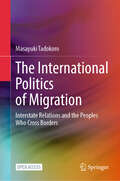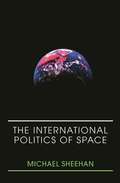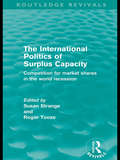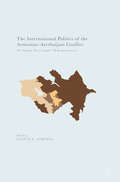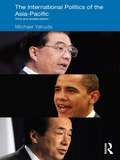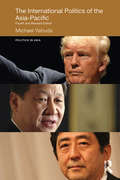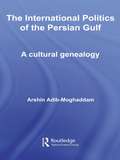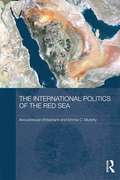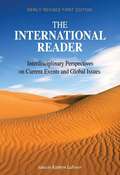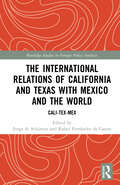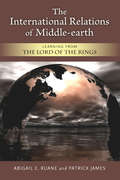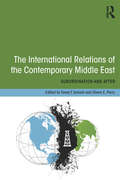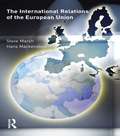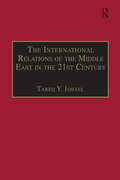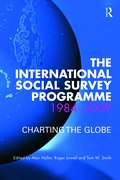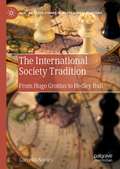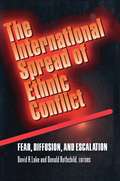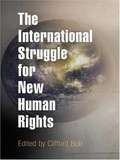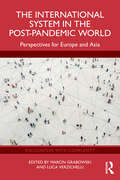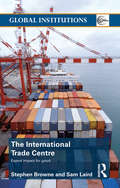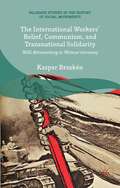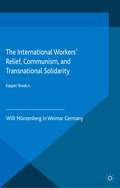- Table View
- List View
The International Politics of Migration: Interstate Relations and the Peoples Who Cross Borders
by Masayuki TadokoroThis open access book discusses the impact of cross-border migration on the relationships between sovereign states. While there is already a vast amount of literature on immigration, it often focuses on issues such as human rights, citizenship, and social integration, reflecting the contemporary interests of Western countries. However, as long as the most fundamental norm of international politics remains the mutual recognition of exclusive jurisdictional rights over territory by sovereign states, people crossing borders pose various challenges to this system of sovereign states. It is this awareness of the issue that makes this book unique. This book examines the implications of the movement of people across national borders both for the state and for international politics. From the standpoint of international politics, the focus of the examination is the international political meaning of the transnational phenomenon of the movement of people. This is an interest that extends from the study of international political economy, which questions the significance for international politics of the transnational phenomena of international trade and international finance.
The International Politics of Space: International Relations Theory And The Politics Of Space (Space Power And Politics Ser.)
by Michael SheehanThe year 2007 saw the fiftieth anniversary of the Space Age, which began with the launching of Sputnik by the Soviet Union in October 1957. Space is crucial to the politics of the postmodern world. It has seen competition and cooperation in the past fifty years, and is in danger of becoming a battlefield in the next fifty. The International Po
The International Politics of Surplus Capacity: Competition for Market Shares in the World Recession (Routledge Revivals)
by Susan Strange Roger ToozeThis important survey, first published in 1981, presents some different and often contending perceptions of the problem of surplus capacity as it re-emerged in the world of the 1980s – an economic climate with many parallels to the current era. Susan Strange and Roger Tooze deliberately assembled writers of many different nationalities, professional backgrounds and ideological convictions and asked them to make the case for their version of the problem. Some even doubt if there really is much of a problem at all. Others see it as fundamentally political, or monetary; as inherent in the capitalist system, or as the product of short-sighted pressure groups and perverse politicians. To help readers judge for themselves, there are specialist contributions on surplus capacity as it has shown up in different sectors of the world economy – shipbuilding, textiles, steel, petrochemicals, insurance and banking – and on the responses of different actors in the international system, including the European Community and multinational corporations.
The International Politics of the Armenian-Azerbaijani Conflict
by Svante E. CornellThis book frames the Armenian-Azerbaijani conflict over Nagorno-Karabakh in the context of European and international security. It is the first book to focus on the politics of the conflict rather than the dispute itself. Since their emergence twenty years ago, this and other "frozen conflicts" of Eurasia have been affected by transformations in European security, and many ways absorbed into an ever fiercer geopolitical struggle for influence. The wars in Georgia and Ukraine brought greater attention to some unresolved conflicts, but not to the conflict between Armenia and Azerbaijan. As the contributors to this volume argue, the conflict merits much greater European attention, for several reasons: it is on a path of escalation, existing mediation regimes are dysfunctional, and as both Georgia and Ukraine have showed, any outbreak of serious fighting will force the EU to respond. This book thus explains the interlocking interests of Russia, Turkey, Iran, the EU and United States in the conflict, and analyzes the negotiation process and the conflict's international legal aspects.
The International Politics of the Asia Pacific: Third and Revised Edition (Politics in Asia)
by Michael YahudaThis fully revised third edition of Michael Yahuda's extremely successful textbook brings the region fully up-to-date, introducing students to the international politics of the Asia-Pacific region since 1945. As well as assessing the post-Cold War uncertainties that challenged the balance and power within the region, Yahuda also examines the first decade of the new millennium which includes no let up on the 'war on terror', new political administrations in all the key player-states and increased cooperative security between some nations, polarized by volatile relationships between others. Analyzing politics in terms of global, regional and local trends, this new edition features: In-depth discussion of the Bush administration's legacy and where the Obama administration's vision takes their policy Analysis of post-Koizumi/post-Abe Japan Examination of the continued rise of China in terms of politics, security and economic dominance Ongoing debates concerning the 'war on terror' and how this shifts, forms and reforms relationships Asia-Pacific security issues This new third edition will continue to be a core text for students of Asian politics, international relations and Cold War history.
The International Politics of the Asia-Pacific: Fourth and Revised Edition (Politics in Asia)
by Michael YahudaThis fully revised fourth edition of Michael Yahuda's successful textbook brings the subject up-to-date, introducing students to the international politics of the Asia-Pacific region since 1945. As well as assessing the post-cold War uncertainties that challenged balance and power with the region, the book also examines the first two decades of the new millennium, which includes no let up on the 'war on terror', new political administrations in all the key player-states and increased cooperative security between some nations, polarised by volatile relationships between others. Analyzing politics in terms of global, regional and local trends, this new edition features: Discussion and evaluation of the Trump Presidency and its implications for the Asia-Pacific region Analysis of Japan’s more assertive foreign policy Examination of the continued Rise of China under Xi Jinping in terms of politics, security, economic dominance and territorial conflicts in the region Ongoing debates concerning the 'war on terror' and how this shifts, forms and reforms relationships Explanation of how America’s war’s in the greater Middle East and the financial crash of 2008 undermined the American led international order. This new fourth edition will continue to be a core text for students of Asian politics, international relations and Cold War history.
The International Politics of the Persian Gulf: A Cultural Genealogy (Routledge Studies in Middle Eastern Politics)
by Arshin Adib-MoghaddamAdib-Moghaddam examines the causes and consequences of conflict in one of the most important regions of the world. Bridging the gap between critical theories of international relations and the empirical study of the Gulf area, this book expands on the many ideologies, cultural inventions and ideational constructs that have affected relations in the past three decades. Key issues explored include: the rise and fall of Arab and Persian nationalism the international repercussions of the Islamic revolution in Iran the events surrounding the three Gulf Wars the 'mindset' of terrorist networks such as al-Qaeda why US neo-conservatism is threatening regional order. Provocatively written, persuasively researched and conclusively argued, The International Politics of the Persian Gulf presents the first comprehensive analysis of international relations in the Gulf from an explicitly multidisciplinary perspective.
The International Politics of the Red Sea (Durham Modern Middle East and Islamic World Series)
by Anoushiravan Ehteshami Emma C. MurphyThis pioneering book is the first comprehensive study of the Red Sea as a sub-region of the international system in its own right. Examining the international politics of the Red Sea region from the Cold War to the present day, it argues that the Red Sea area demonstrates the characteristics of a sub-regional system, given its increasing economic and social interdependence, greater regional integration, and flows of resources across it. It details how stronger regional powers - Egypt, Israel and Saudi Arabia - which co-habit the sub-region with much weaker, vulnerable and fragile states, are seeking to stamp their own authority on this dynamic sub-region. They have attempted to do so, the authors show, through extension of their military and economic influence where ever possible, while also forging regional partnerships aimed at protecting their interests or to fend off possible encroachment of others. The book discusses in great detail the security and military dynamics of the sub-region; land and maritime borders; as well as economic issues, including trade, migration, capital flows and transport. It covers developments across the Red Sea and also within all the states of this newly-forming sub-region.
The International Reader: Interdisciplinary Perspectives on Current Events and Global Issues
by Kathryn Schaeffer LafeverThe International Reader: Interdisciplinary Perspectives on Current Events and Global Issues provides students with diverse insights into major world regions and an array of complex topics and current events. The book is organized into chapters on each of the six major world regions: Africa, Asia, Europe, Latin America, the Middle East, and Oceania. It features an extensive vocabulary, regional maps, and a list of countries in each region. The anthology employs an interdisciplinary approach, encouraging students to question, discuss, and analyze global issues across a range of disciplines and fields of study. Topics addressed include the recent surge of populism in Europe, the effects of climate change in Oceania, Islamist extremism in East Africa, the remittance economy in the Middle East, the economic and migrant crisis in Venezuela, and more. The newly revised first edition features new content on poverty and colonialism in Africa, cuteness as Japan's millennial product, authoritarianism in Egypt, the ongoing legacy of colonialism in Australia, and the confluence of sustainability and social justice issues.
The International Relations of California and Texas with Mexico and the World: Cali-Tex-Mex (Routledge Studies in Foreign Policy Analysis)
by Rafael Fernández de Castro Jorge A. SchiavonThis book analyzes the international relations of Mexico and the two most important sub-state governments of the United States, California and Texas. It explains why and how these two states conduct their international relations (IR) with Mexico and the world, and how national authorities and local governments coordinate in the definition and implementation of their international policies. Expert contributors from across the Americas offer a historical and current analysis, exploring which areas of cooperation—trade, investment, border cooperation, energy, migration—matter most. They also consider the institutional and legal bases of Mexican and U.S. states’ international relations, the changing nature of the U.S. federal system, the impact on international partners, the role of Latinos and the future of paradiplomacy in the region. The book will be of interest to scholars and students of International Relations, comparative politics, diplomacy, foreign policy, governance, and federalism, as well as business people, social leaders, and practitioners of diplomacy and paradiplomacy around the world.
The International Relations of Middle-earth: Learning from the Lord of the Rings
by Abigail E. Ruane Patrick JamesBased on their successful undergraduate course at the University of Southern California, Abigail E. Ruane and Patrick James provide an introduction to International Relations using J. R. R. Tolkien's fantastically popular trilogy The Lord of the Rings. Because Tolkien's major themes---such as good versus evil and human agency versus determinism---are perennially relevant to International Relations, The Lord of the Rings is well suited for application to the study of politics in our own world. This innovative combination of social science and humanities approaches to illustrate key concepts engages students and stimulates critical thinking in new and exciting ways.
The International Relations of the Contemporary Middle East: Subordination and Beyond (Contemporary Issues In The Middle East Ser.)
by Tareq Y. Ismael Glenn E. PerryThe Middle East, a few decades ago, was seen to be an autonomous subsystem of the global international political system. More recently, the region has been subordinated to the hegemony of a singular superpower, the US, bolstered by an alliance with Israel and a network of Arab client states. The subordination of the contemporary Middle East has resulted in large part from the disappearance of countervailing forces, for example, global bipolarity, that for a while allowed the Arab world in particular to exercise a modicum of flexibility in shaping its international relations.The aspirations of the indigenous population of the Middle East have been stifled by the dynamics of the unequal global power relationships, and domestic politics of the countries of the region are regularly subordinated to the prerogatives of international markets and the strategic competition of the great powers. Employing the concept of imperialism, defined as a pattern of alliances between a center (rulers) in the Center (developed) country and a center (client regime) in the Periphery (underdeveloped country) - as an overall framework to analyse the subordination of the region, this book is essential reading for students and scholars of the Middle East, International Relations, and Politics in general.
The International Relations of the EU
by Steve Marsh Hans MackensteinIn an incisive and lively discussion International Relations of the EU examines both the economic and security dimensions of European Union external relations. The book adopts an innovative approach that combines International Relations with International Political Economy.Set against a backdrop of EU enlargement and disarray over military intervention in Iraq, International Relations of the EU is a timely contribution to our understanding of the Eu's role as an international actor. The text is suitable for advanced undergraduate courses in Politics and International Relations.
The International Relations of the Middle East in the 21st Century: Patterns of Continuity and Change
by Tareq Y. IsmaelA comprehensive and timely survey of Middle Eastern international relations, Tareq Ismael provides in-depth analysis of the interrelated dimensions of confrontation that have entangled almost every aspect of life in the region, transforming it into a 'penetrated political system'. Essential for readers interested in the Middle East, international relations, politics, history and public policy.
The International Relations of the Persian Gulf
by III F. Gregory GauseGregory Gause's masterful book is the first to offer a comprehensive account of the international politics in the Persian Gulf across nearly four decades. The story begins in 1971 when Great Britain ended its protectorate relations with the smaller states of the lower Gulf. It traces developments in the region from the oil 'revolution' of 1973-74 through the Iranian revolution, the Iran-Iraq war and the Gulf war of 1990-91 to the toppling of Saddam Hussein in the American-led invasion of Iraq in 2003, bringing the story of Gulf regional politics up to 2008. The book highlights transnational identity issues, regime security and the politics of the world oil market, and charts the changing mix of interests and ambitions driving American policy. The author brings his experience as a scholar and commentator on the Gulf to this riveting account of one of the most politically volatile regions on earth.
The International Responsibility of International Organisations
by Moelle Moritz P.The International Responsibility of International Organisations addresses the joint responsibility of organisations for violations of international law committed during the deployment of peacekeeping operations. More specifically, it inquires if and under which circumstances - in terms of the notion of control - international organisations can be jointly responsible. The author analyses the practice of international organisations (the United Nations, NATO, the European Union, the African Union and the Economic Community of West African States) on an inter-institutional level, as well as in the field in the form of five case studies. The likelihood and distribution of responsibility between international organisations engaged in peacekeeping operations is affected by the different layers of applicable primary norms (Security Council mandates, internal law of the organisations, international humanitarian and human rights law). Although external pressure may contribute to enhancing the effectiveness of holding international organisations jointly responsible, any substantial measures and mechanisms can only be implemented with the participation of states and international organisations.
The International Social Survey Programme 1984-2009: Charting the Globe (Social Research Today)
by Roger Jowell Max Haller Tom W. SmithThe social sciences rely more on the comparative method than on experimental data mainly because the latter is difficult to acquire amongst human populations. The International Social Survey Programme has played a pioneering role in creating and sustaining methodologically-sophisticated mass attitude surveys across the globe. Starting in 1984 with five nations, it now encompasses forty-five nations spread over five continents, each administering an identical annual survey to a random sample of their population. Analyses of the data or descriptions of the methodology already appear in over 3,000 publications. This book contains new contributions from three dozen eminent scholars who analyse and compare the perceptions and attitudes of citizens across all five continents, nations and over time. Subjects range from inequality and the role of the state; ethnic, national and global identities; the changing relevance of religion, beliefs and practices; gender roles, family values and work orientations; household and society. Some chapters focus on methodological issues; others focus on substantive findings. This book sets new standards for cross-cultural research.
The International Society Tradition: From Hugo Grotius to Hedley Bull (Palgrave Studies in International Relations)
by Cornelia NavariThis book traces the development of the international society tradition from its origins in Grotius’ On the Law of War and Peace to its crystallization in Bull’s The Anarchical Society. It follows the idea of sociability among peoples as it was presented by Grotius and substantiated by Pufendorf, through the skepticism of Voltaire and Kant, to emerge as humanitarian warfare and human rights in the international liberal movement, ‘world society’ in the 20th century Catholic revival, and common practices and social understandings in the English School in the period of disciplinary development in international relations after the Second World War.
The International Spread of Ethnic Conflict: Fear, Diffusion, and Escalation
by David A. Lake & Lake Donald RothchildThe wave of ethnic conflict that has recently swept across parts of Eastern Europe, the former Soviet Union, and Africa has led many political observers to fear that these conflicts are contagious. Initial outbreaks in such places as Bosnia, Chechnya, and Rwanda, if not contained, appear capable of setting off epidemics of catastrophic proportions. In this volume, David Lake and Donald Rothchild have organized an ambitious, sophisticated exploration of both the origins and spread of ethnic conflict, one that will be useful to policymakers and theorists alike. The editors and contributors argue that ethnic conflict is not caused directly by intergroup differences or centuries-old feuds and that the collapse of the Soviet Union did not simply uncork ethnic passions long suppressed. They look instead at how anxieties over security, competition for resources, breakdown in communication with the government, and the inability to make enduring commitments lead ethnic groups into conflict, and they consider the strategic interactions that underlie ethnic conflict and its effective management. How, why, and when do ethnic conflicts either diffuse by precipitating similar conflicts elsewhere or escalate by bringing in outside parties? How can such transnational ethnic conflicts best be managed? Following an introduction by the editors, which lays a strong theoretical foundation for approaching these questions, Timur Kuran, Stuart Hill, Donald Rothchild, Colin Cameron, Will H. Moore, and David R. Davis examine the diffusion of ideas across national borders and ethnic alliances. Without disputing that conflict can spread, James D. Fearon, Stephen M. Saideman, Sandra Halperin, and Paula Garb argue that ethnic conflict today is primarily a local phenomenon and that it is breaking out in many places simultaneously for similar but largely independent reasons. Stephen D. Krasner, Daniel T. Froats, Cynthia S. Kaplan, Edmond J. Keller, Bruce W. Jentleson, and I. William Zartman focus on the management of transnational ethnic conflicts and emphasize the importance of domestic confidence-building measures, international intervention, and preventive diplomacy.
The International Struggle for New Human Rights
by Clifford BobIn recent years, aggrieved groups around the world have routinely portrayed themselves as victims of human rights abuses. Physically and mentally disabled people, indigenous peoples, AIDS patients, and many others have chosen to protect and promote their interests by advancing new human rights norms before the United Nations and other international bodies. Often, these claims have met strong resistance from governments and corporations. More surprisingly, even apparent allies, such as Amnesty International, Human Rights Watch, and other nongovernmental organizations, have voiced misgivings, arguing that rights "proliferation" will weaken efforts to protect their traditional concerns: civil and political rights.Why are certain global problems recognized as human rights issues while others are not? How do local activists transform long-standing problems into universal rights claims? When and why do human rights groups, governments, and international organizations endorse new rights? The International Struggle for New Human Rights is the first book to address these issues.Focusing on activists who advance new rights, the book introduces a framework for understanding critical strategies and conflicts involved in the struggle to persuade the human rights movement to move beyond traditional problems and embrace pressing new ones.Essays in the volume consider rights activism by such groups as the South Asian Dalits, sexual minorities, and children of wartime rape victims, while others explore new issues such as health rights, economic rights, and the right to water. Examining both the successes and failures of such campaigns, The International Struggle for New Human Rights will be a key resource not only for scholars but also for those on the front lines of human rights work.
The International System in the Post-Pandemic World: Perspectives for Europe and Asia (Encounters with Complexity)
by Luca Verzichelli Marcin GrabowskiThis book analyses the multidimensional influence of COVID-19 on world politics, with a special focus on Euro-Asian relations, as well as changes in Europe caused by the pandemic. Expert international and interdisciplinary contributors analyse the measures undertaken to counter COVID, its use to justify increased governmental surveillance, the role of religion and regional institutions and the great power transformations, and the economic crisis that resulted from it. The question driving each chapter is to what extent COVID-19, and the reaction to it, transformed the world. The book will be of interest to scholars and students of International Relations, Foreign Policy Analysis, Public Diplomacy, World Politics and Security Studies. This publication will be also relevant for professionals in the corporate world, international business, state departments, political journalism and think tanks.
The International Thought of Alfred Zimmern: Classicism, Zionism and the Shadow of Commonwealth (The Palgrave Macmillan History of International Thought)
by Tomohito BajiThis book is a comprehensive examination into the shifting international thought of Alfred Zimmern, a Grecophile intellectual, one of the most prominent liberal internationalists and the world’s first professor of IR. Identifying the writings of Burke and cultural Zionism as two important ideological sources that defined his project for empire and global order, this book argues that Zimmern can best be understood as an apostle of Commonwealth. It shows that while his proposals changed from cosmopolitan democracy to Euro-Atlanticism and to world federal government, they were constantly shaped by the organizing principles of a professedly universal British Commonwealth. It was the empire transhistorically chained to classical Athens.
The International Trade Centre: Export Impact for Good (Global Institutions)
by Stephen Browne Sam LairdIn the era of rapid globalization, the ITC plays a significant and wide ranging role working with both governments and trade support institutions to nurture an export culture, this work will provide a much needed overview of this dynamic organization. This book: Details the history of the organization since its inception Examines its current mandate and the impact of recent reforms Analyses the ability of the ITC to provide trade intelligence, and its role in the development of national export strategies Evaluates the future challenges, and emphasises that the ITC must continue to broaden its mandate and continue to be responsive and results orientated to remain a key player The status of ITC – half-in and half-out of the UN – could prove to be an interesting model for the future, and this work will be of interest to not only to academics but also government trade specialists and negotiators, the "aid for trade" donors, NGOs, and those involved in the running of international organizations.
The International Workers’ Relief, Communism, and Transnational Solidarity (Palgrave Studies in the History of Social Movements)
by Kasper BraskénThe International Workers’ Relief, Communism, and Transnational Solidarity.
The International Workers’ Relief, Communism, and Transnational Solidarity: Willi Münzenberg in Weimar Germany (Palgrave Studies in the History of Social Movements)
by Kasper BraskénThe first major study on the making of new cultures, movements and public celebrations of transnational solidarity in Weimar Germany. The book shows how solidarity was used to empower the oppressed in their liberation and resistance movements and how solidarity networks transferred visions and ideas of an alternative global community.
